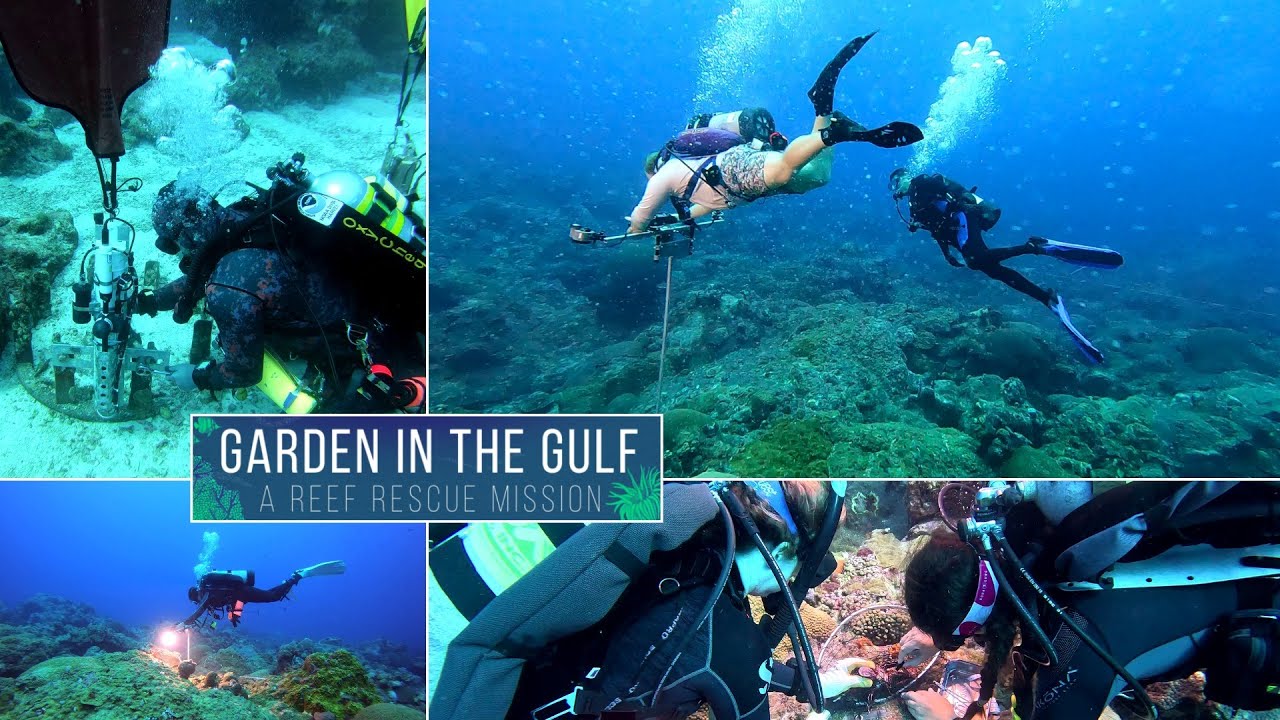- The Garden in the Gulf initiative aims to restore and protect coral reefs, focusing on biodiversity and ecological resilience.
- The project utilizes innovative techniques in marine biology and conservation, such as coral farming and transplantation.
- Collaboration among scientists, conservationists, and local communities is key to the initiative’s success.
- The program highlights the critical role of education and awareness in wildlife conservation efforts.
- It explores the impact of climate change on marine ecosystems and the importance of sustainable practices in preserving oceanic habitats.
Garden in the Gulf: A Reef Rescue Mission
The Garden in the Gulf initiative is an inspiring story of marine conservation focused on reviving and safeguarding coral reefs. These ecosystems, vital to oceanic health, are under threat from human activities and climate change. This initiative employs groundbreaking methods in marine biology and conservation to reverse damage and foster biodiversity.
Innovative Techniques in Coral Restoration
To address the critical need for reef conservation, the initiative employs coral farming and transplantation. Coral farming involves cultivating corals in controlled environments. These ‘nurseries’ simulate natural conditions, fostering optimal growth. Once mature, these corals are transplanted onto damaged reefs, helping restore their structural integrity.
This hands-on approach not only aids in reef recovery but also increases ecological resilience. By selecting coral species that show signs of climate tolerance, scientists aim to cultivate reefs better suited to weathering future environmental stressors. The initiative highlights how scientific ingenuity can provide practical solutions to ecological crises, reinforcing the need for continued innovation in marine conservation efforts.
Collaboration for Conservation
Collaboration is central to the success of the Garden in the Gulf initiative. Scientists and conservationists work closely with local communities, involving them in reef restoration efforts. This partnership approach fosters a sense of stewardship among residents who rely on these ecosystems for their livelihoods. Community engagement ensures that conservation strategies are practical and culturally sensitive.
Local fishermen, for example, are trained to monitor coral health and report any disturbances. This grassroots involvement not only enhances project outcomes but also empowers communities, providing them with tools and knowledge to safeguard their natural resources. Scientists gain invaluable insights into local ecology, ensuring that interventions are well informed and contextually appropriate.
Education and Awareness
Education is a powerful tool in promoting conservation. The initiative prioritizes educational programs to raise awareness about the importance of coral reefs and the threats they face. Workshops, school programs, and public seminars help demystify complex ecological concepts, making them accessible to various audiences.
By fostering an understanding of marine ecosystems and their significance, these educational efforts inspire a new generation of conservationists. Participants learn about sustainable practices and how individual actions can impact the ocean. As awareness grows, so does public support for conservation policies and initiatives, creating a ripple effect that benefits environmental protection efforts on a broader scale.
Impact of Climate Change on Marine Ecosystems
Climate change is a significant driver of reef degradation. Rising sea temperatures cause coral bleaching, where stressed corals expel the symbiotic algae they rely on for nutrients. This process weakens the corals, making them more susceptible to disease. The initiative emphasizes the urgent need to address climate change’s impacts on marine ecosystems.
Scientists involved in the project are researching heat-resistant coral species and experimenting with methods to bolster coral resilience. The initiative highlights the interconnectedness of environmental issues, showing how local conservation efforts can inform global climate strategies. By addressing both immediate restoration needs and long-term climate challenges, the program sets an example for comprehensive environmental stewardship.
Sustainable Practices for Oceanic Preservation
A key message of the Garden in the Gulf initiative is the importance of sustainable practices in preserving marine habitats. Overfishing, pollution, and coastal development further strain coral reefs, making sustainability an essential part of conservation strategies. The initiative encourages sustainable fishing practices, reduction of plastic use, and responsible tourism, illustrating how everyday actions contribute to ecosystem health.
Support for policy changes and international cooperation is also crucial. The initiative advocates for stronger regulations to protect marine environments and seeks partnerships with organizations dedicated to ocean conservation. These efforts underscore the role of sustainability in fostering resilient ecosystems, ensuring that coral reefs can thrive for future generations.
By focusing on innovation, collaboration, education, and sustainability, the Garden in the Gulf initiative offers a holistic approach to tackling the challenges facing coral reefs. This program not only strives to rehabilitate damaged ecosystems but also seeks to instill a sense of ecological responsibility in communities worldwide, paving the way for a more sustainable relationship with our oceans.
*****
Source Description
🌊🐠 Dive into a hidden world beneath the Gulf!
Catch the full episode (aired April 24) of “Garden in the Gulf: A Reef Rescue Mission” by KPRC, hosted by Chief Meteorologist Anthony Yanez. Follow him as he joins teams from Moody Gardens® and NOAA: National Oceanic & Atmospheric Administration on an underwater journey into the vibrant Flower Garden Banks National Marine Sanctuary—just 100 miles off the Galveston coast!
Discover why coral reefs matter, the threats they face, and how conservation efforts at Moody Gardens are making waves. 🌍💙
Learn more on click2houston.com/conservation
Footage provided by @KPRC2Click2Houston


